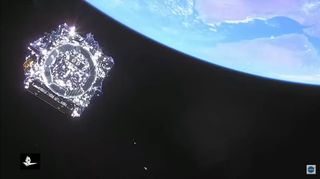Page History
"Webb Space Telescope" identifier
What:
The James Webb Space Telescope is an orbiting infrared observatory that will complement and extend the legacy of earlier space-based telescopes to push the boundaries of human knowledge even further, to the formation of the first galaxies and the horizons of other worlds.
As Webb is scheduled to launch on December 22, 2021 and prepares to begin science operations over the following several months, NASA will provide support to communities everywhere to help you join in celebrating this generational event. Webb’s launch and commissioning, culminating in the release of fabulous new images in Summer UniverseWhy:
Webb will be the premier observatory of the next decade. It will study every phase in the history of our Universe. Our goal is that with your help, Webb’s launch and commissioning will captivate and inspire a new generation of space science enthusiasts, reaching a broader, more diverse audience than ever before.
Who:
Any museum, science center, planetarium, public library, nature center, visitor’s center, community college, or other non-profit , receive supporting materials. The opportunity is open to traditionally underrepresented orWhat We Will Provide
- A point of contact to answer questions and provide assistance as necessary (U.S. domestic only)
- Access to expert knowledge
- Optional training
- Editable public presentation slide deck
- Selected physical materials (may include bookmarks, stickers, etc.) (U.S. domestic only)
- Digital materials (activity guides, videos, web features, etc.)
- Materials to help you promote your events (including editable digital flyers)
- Updates on Webb’s status
- Ways to connect to others in your area who are interested in celebrating Webb’s first images (U.S. domestic only)
Event Timing and Format
First image Community Events can take place anytime between the day the images are released in July and October. Events that take place on the day of image release, however, will be more visible. The events can be in-person, virtual or hybrid.
Requirements
in STEM (science, technology, engineering, and math) to request support.When:
Events can be supported for any time between September 2021 through the release of the first images in Summer 2022. There are a number of major milestones for the observatory in the interim as it prepares to begin science operations that you may wish to highlight in your events. In order to connect a Webb subject matter expert to your event, we require at least 2 months between your event date and the request for support. As Webb reaches its orbital destination and prepares to begin science operations, digital resources and activity guides are available for other events you may want to hold around other mission milestones.
Official US Sites:
Request a Subject Matter Expert to speak at your event!
Request materials for your event
Resources for advertising and media
Press release template for your Webb Community Event
Training sessions and slides:
Recording of Host Training session #1
After your event:
Please fill out this evaluation form to help us understand your needs better for future efforts.
Criteria:
Sites receiving support will:- Have a safety plan, including COVID-19 considerations, as well as a digital virtual back-up plan for in person events
- Work with community partners to reach underserved audiences in their communities
- Host an event that is free & open to the public
Webb Mission Milestones:
Launch is only the beginning of Webb's long journey before it can begin science operations. As it travels to its final orbit around the Sun, 1 million miles from Earth, the telescope unfold and start readying itself for science!
- (or your membership)
- Offer feedback through our evaluation form
To apply to be a Community Event host, click here. Deadline for applications is Friday, February 25, 2022.
NASA's Webb Space Telescope Resources:
NASA STEM Education Webb Toolkit
Guide to infrared for high-school age groups
Activity Guides & Program Models
Slide deck
Webb Launch outreach slide deck
Presentación sobre Webb en Español
Media Release Forms:
Release form for Guardians and Minors (English & Spanish)
Social Media Channels:
Partner Resources:
NISE Net training on engaging informal education audiences with Webb
NISE Net training on engaging informal education audiences with Webb pt 2
Night Sky Network training on engaging public audiences with Webb
StarNet training on engaging library audiences with Webb
StarNet "Look Up!" Webb resources
NISE Net resources for informal educators

